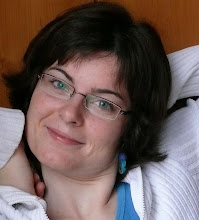 As I said, the level of English of Danish young pupils is pretty good. On of the reasons is that they have a lot of TV programs and films in original, with subtitles (films are really rarely dubbed). I found that very interesting and valuable - all the people have contact with native Enlish really often. The media - both TV and the internet - play very important role in people´s lives. And if the TV programs are in English, it is pretty good. And children can also see usefulness of the foreign language. In Czech schools English is something you learn, but you can´t see the immediate utility. It is just something a bit "artificial" for the pupils...
As I said, the level of English of Danish young pupils is pretty good. On of the reasons is that they have a lot of TV programs and films in original, with subtitles (films are really rarely dubbed). I found that very interesting and valuable - all the people have contact with native Enlish really often. The media - both TV and the internet - play very important role in people´s lives. And if the TV programs are in English, it is pretty good. And children can also see usefulness of the foreign language. In Czech schools English is something you learn, but you can´t see the immediate utility. It is just something a bit "artificial" for the pupils...The second thing is that English teaching is much more focused on SPEAKING - rather then grammar, rules and learning vocabulary by heart, as it is in the CR. People in the CR are quite confident in writing;however, when they should speak, they are often very shy. Just not confident enough, because they are too much focused on grammar and "correct language", they are afraid of making mistakes. But it is a part of learning, isn´t it? We need to use the language, to communicate in order to improve throught this process...
I spend quite a lot of time with my teaching and activities in English. The first week we did crosword about London in 6.a and 6.b, connected with my presentation and narrative about London, where I spent 2 months in summer. For the second week I prepared a presentation about the Czech Republic with a true-false statements activity. I really enjoyed the communication with pupils, the questions they had - as I mentioned before (General Notices and Reflections).
The third week I got very good chance from Tanja - she told me that she was having a day-off on Tuesday - and she gave me a choice - to get a substitute teacher/ or to TEACH ALONE ON MY OWN the whole lesson . And I considered that as a big challenge, so I told - OK, I will take it and try :-). Why not?
Finally, Jette Laursen came to the lesson to observe, therefore I was not really alone. ;-) However, it was a good chance and I liked it very much. I prepared various communication games for pupils and I think we all enjoyed it a lot. For me it was a good chance to try games, which I knew only from theoretical lessons, methodology, but I had never had a chance to try them in "real life".:-)
It gave me a lot of reflections, how it was working, what to improve, what else to use...
THANK YOU FOR THAT CHANCE.











